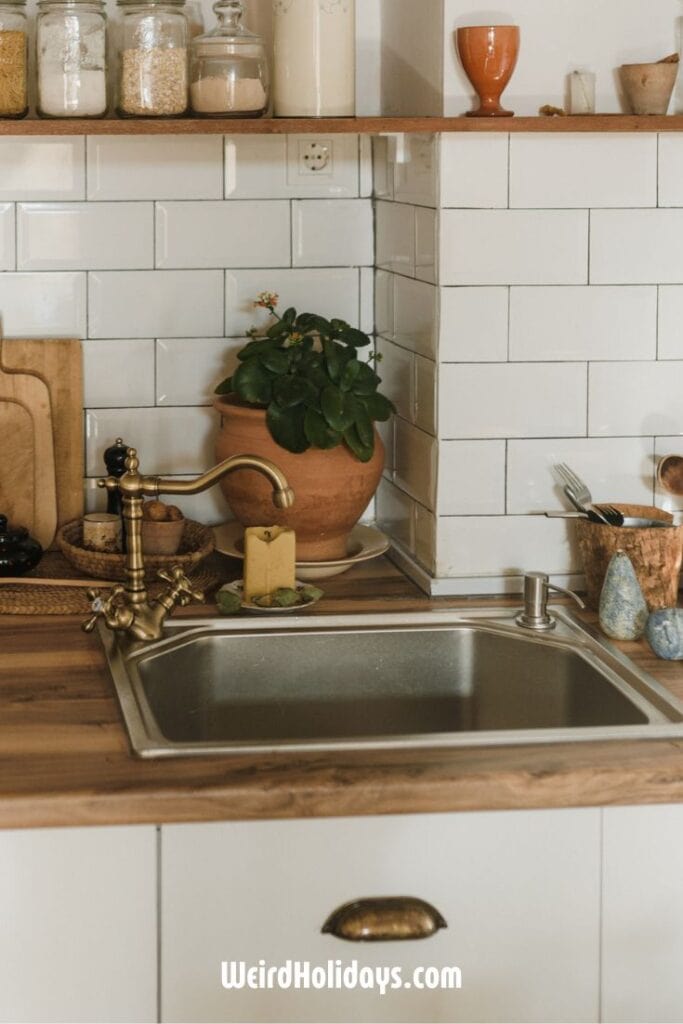National No Dirty Dishes Day (May 18)

Imagine enjoying your favorite meals without worrying about the aftermath of dishes stacked in the sink.
That’s the charm of National No Dirty Dishes Day, celebrated annually on May 18th.
Whether you dine out, order in, or stick to one-pot recipes, it’s a guilt-free pass to skip the cleanup.
This quirky observance invites us to rethink daily routines and embrace a little extra ease. It’s one of many weird holidays in May that offers a fun break from the norm.

When is the Holiday?
National No Dirty Dishes Day is observed each year on May 18th.
Who Invented It?
The origin is unclear, but it’s likely a modern creation—possibly by an exhausted home cook looking to dodge the nightly pile of plates.
Like many unofficial observances, it likely gained traction online and through lifestyle media as a fun, relatable excuse for a night off from dish duty.

The History of the Holiday
While not tied to a specific person or event, this day taps into a universal feeling: the desire to skip cleanup. Its popularity grew alongside the rise of disposable dinnerware and busy lifestyles.
Over time, it’s evolved into a celebration of low-effort meals and convenience—an ode to simplicity in the kitchen.

Top 5 Facts About the Holiday
Biodegradable dinnerware is now made from palm leaves, wheat bran, and even avocado pits. Celebrating this holiday can be low-impact and futuristic—your “disposable” plate might literally compost in a few weeks.
The average person spends over 230 hours a year washing dishes. That’s nearly 10 full days—just scrubbing, rinsing, and drying. This holiday is a tiny rebellion against that time sink.
Martin Keyes, the paper plate pioneer, created the first ones to fight disease. In 1903, he launched disposable plates to help stop the spread of tuberculosis at public gatherings. Clean hands, clean plate, no sink.
The Dixie Cup was born in a battle against shared germs. Invented in 1907 as the “Health Kup,” it was created after studies showed how many illnesses spread from public drinking dippers.
Modern dishwashers use less water than handwashing—if you run them full. Despite the holiday’s anti-dishwashing theme, eco-friendly households may be better off filling that machine once a day than rinsing by hand.

**This post may contain affiliate links. As an Amazon Associate and a participant in other affiliate programs, I earn a commission on qualifying purchases.**
Creative Ways to Celebrate the Holiday
- Picnic in the Park: Take your meal outdoors with a picnic in a nearby park or a relaxing day at the beach. Pack sandwiches, salads, and finger foods that require no utensils or plates. Don’t forget a cozy blanket to sit on.
- Order Takeout: Give yourself a break from cooking by ordering your favorite takeout or delivery. Many restaurants offer convenient and eco-friendly packaging, making cleanup a breeze.
- Cook One-Pot Meals: If you enjoy cooking but want to keep cleanup to a minimum, opt for one-pot meals like stir-fries, pasta dishes, or sheet pan dinners. These recipes often require only a single pot or pan.
- Dine Out: Visit a local restaurant or café and savor a meal prepared by someone else. This is the ultimate way to celebrate the holiday, as you won’t have to worry about any dishes whatsoever.
- Use Disposable Dinnerware: While it might not be the most eco-friendly option, using disposable plates, cups, and utensils can simplify cleanup. Look for biodegradable or compostable options to reduce environmental impact.
- Host a Potluck: Invite friends or family over for a potluck-style meal. Each guest can bring a dish to share, and since everyone contributes, there will be fewer dishes for you to clean.
- Try Finger Foods: Plan a menu of finger foods and appetizers, like sliders, mini quiches, and vegetable platters. These tasty treats often require little to no utensils.
- Experiment with No-Bake Desserts: For those with a sweet tooth, explore the world of no-bake desserts, such as cheesecakes, truffles, cookies, or fruit parfaits. These treats are as easy to make as they are to enjoy.
- Set Up a DIY Sandwich Bar: Create a DIY sandwich or wrap bar with various fillings, condiments, and toppings. Everyone can assemble their own meal, minimizing the need for dishes.
- Dishwashing-Free Cocktails: If you’re planning to enjoy a drink, opt for cocktails that require no shakers or mixing glasses. Stick to beverages that can be served in disposable cups or require minimal cleanup.

Related Holidays
- National Lazy Day (August 10) – A perfect companion, this holiday encourages you to unapologetically do nothing. Skip the chores, the errands, and yes—definitely the dishes. It’s all about rest and recharge.
- International Picnic Day (June 18) – Grab a blanket, pack some finger foods, and head outdoors. It’s built around easy meals and minimal cleanup. Bonus points if your meal doesn’t need utensils.
- National Pizza Party Day (Third Friday in May) – This is a built-in excuse to eat pizza straight from the box. No plates, no forks, and no post-party mess—just greasy fingers and happy memories.

Pin it!
Share this post about National No Dirty Dishes Day on Pinterest!

